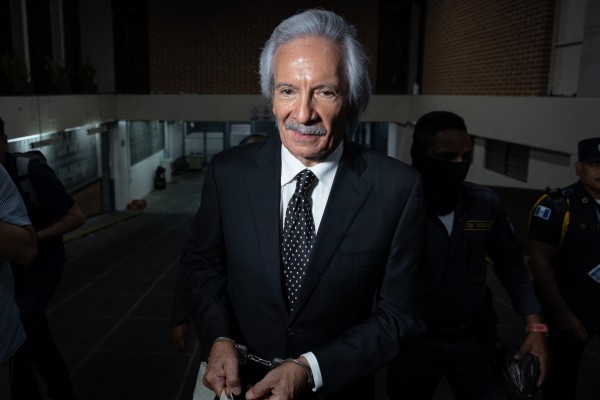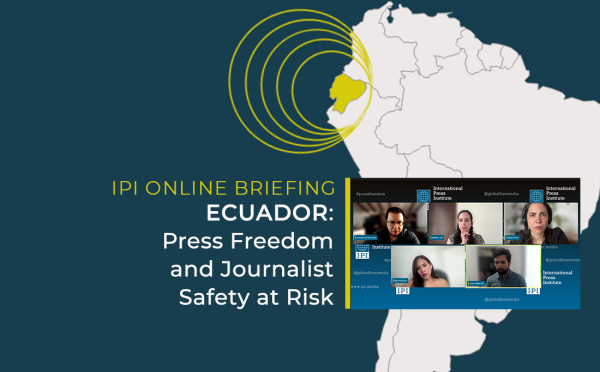The International Press Institute (IPI) on Wednesday completed a four-day press freedom advocacy mission to Venezuela, during which it held discussions with leading editors and journalists from a broad range of media, as well as representatives of journalists’ associations, civil society and academia.
IPI conducted the mission to make an objective assessment of the current state of press freedom in the country.
The IPI delegation noted with concern a continued deterioration of press freedom in Venezuela – placed on IPI’s Watch List in October 2000 – due to a climate of intimidation and hostility towards journalists and media outlets, as well as to a legal and judicial system that threatens the free practice of journalism.
The delegation also noted that the country’s highly polarised and politicised media environment reflects Venezuelan society’s deep divisions.
While Manuel Villalba, president of the Media Commission of the Venezuelan National Assembly, and representatives of the pro-government Periodistas por la Verdad (Journalists for Truth) insisted that press freedom is respected in the country, numerous complaints voiced by individual journalists and representatives of journalists’ associations suggested otherwise.
The increasingly aggressive and inflammatory rhetoric of President Hugo Chávez and members of his administration against the privately-owned and largely pro-opposition media may have encouraged local officials, pro-government supporters and others to threaten, harass and even physically attack journalists and media outlets.
Moreover, the Venezuelan authorities have failed to bring to justice those responsible for physical attacks against journalists, contributing to a climate of impunity in the country.
Apart from verbal and physical aggression against journalists and the impunity that accompanies such attacks, participants in IPI’s discussions complained of an increase in legal and administrative harassment, the alleged use of government advertising to either reward or punish media outlets, and lack of free and equal access to information for all media.
On 1 August 2009, the country’s telecommunications administrator, CONATEL, closed down 32 radio broadcasters and two regional television stations indefinitely for allegedly failing to submit paperwork regarding their ownership. This followed a 9 July announcement that the government would begin proceedings against more than 200 privately-owned radio stations – as yet unnamed – for allegedly failing to submit requested documentation to CONATEL within a three-week deadline.
Broadcasters that were not shut down on 1 August fear that they might be on the original list of 200-odd stations and could also be closed.
Six sets of administrative proceedings, initiated by CONATEL, are also pending against the Caracas-based TV broadcaster Globovisión, which could result in the temporary or definitive closure of that channel at any time. The country’s oldest private TV station, Radio Caracas Television (RCTV), was closed down in May 2007 after it was accused of violating the 2005 Law of Social Responsibility in Radio and Television. RCTV continues to operate via cable and satellite, but says there have been unsuccessful legal attempts to shut down its cable operations.
Journalists also told the IPI delegation that the recent introduction of new legislation, including the Law of Social Responsibility and the Organic Law on Education, passed on 13 August, threatens press freedom in Venezuela and that the existence of these laws, coupled with dozens of legal proceedings against individual journalists, has led to an increase in self censorship in the media.
Another major source of concern among Venezuelan journalists is the lack of access to official information. Critical media outlets are denied interviews with President Chavéz, members of his administration, and other officials, journalists told the IPI delegation. They are also allegedly unable to access government buildings or offices, or report from the National Assembly.
With the exception of National Assembly Deputy Manuel Villabla, the IPI delegation was unable to meet with members of the Venezuelan government or ruling party.
“The fact that Venezuelan authorities refused to meet with the IPI delegation provides a good example of lack of access to information in the country,” said IPI delegation member Galina Sidorova.
“Access to information is essential to any functioning democracy and IPI urges the Venezuelan government to ensure that members of all media are allowed free and equal access to official information. We also call on the authorities to stop using legal and administrative measures in their apparent attempt to silence critical reporting.”
The IPI delegation was comprised of IPI Executive Board Member Galina Sidorova, editor-in-chief of the Russian monthly investigative magazine, Sovershenno Secretno, and IPI Mission Coordinator Michael Kudlak.
IPI will release a detailed report of its findings in January 2010.
For further inquiries on Venezuela, please contact Colin Peters, IPI Press Freedom Adviser for the Americas, at IPI headquarters in Vienna (Tel: + 431-512 90 11; Email: [email protected]).


